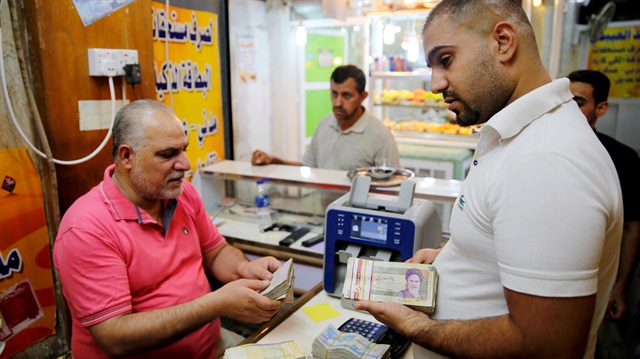

A man counts Iranian rials using a money counting machine at a currency exchange shop in Baghdad, Iraq August 8, 2018.
Re-imposition of sanctions on Iran leads to bout of inflation, with more expected
A first phase of U.S. sanctions banning the sale of dollars, gold and other precious metals to Iran has tangibly impacted the lives of the Iranian people, most notably through soaring commodity prices.
Although the government is trying to reign in inflation by adopting a raft of policy measures, prices continue to rise daily, especially in the housing, automotive and imported-goods sectors.
Acute shortages of diapers and sanitary napkins have caused particular concern among many Iranians.
At a recent meeting with President Hassan Rouhani and members of his cabinet, Supreme Leader Ayatollah Ali Khamenei asserted that Iran’s “enemies” had orchestrated the “diapers crisis” with a view to sowing anger among the Iranian people.
Earlier, Ahmad Jannati, chairman of Iran’s Assembly of Experts, a deliberative body, addressed the crisis during a session of parliament.
In an interview with the Iranian Labor News Agency, Seyed Hassan Dokmehchi, head of the Iranian Drugstore Union, said 10 diaper factories had recently closed in Iran due to a lack of raw materials caused by the re-imposition of U.S. sanctions.
According to the Tasnim News Agency (affiliated with Iran’s Revolutionary Guards, the price of one pack of 34 diapers recently jumped from 500,000 Iranian rials (slightly less than $5) to a current 850,000 rials (over $8).
In November, a second phase of U.S. sanctions banning the purchase of Iranian oil and gas is expected to come into effect.
Observers fear that this will lead to further price hikes for many basic commodities, including foodstuffs and medicine, the brunt of which will be borne by Iranian citizens.
In mid-2015, Iran signed a landmark nuclear deal with the P5 1 group of nations (the five permanent UN Security Council members plus Germany).
The agreement placed tight restrictions on Iran's nuclear program in exchange for billions of dollars in sanctions relief.
In May of this year, however, U.S. President Donald Trump unilaterally withdrew his country from the agreement in a move heavily criticized by the deal's European signatories.
Washington then re-imposed sanctions on Iran, which primarily target the country’s banking sector.
#Iran
#sanctions
#US



